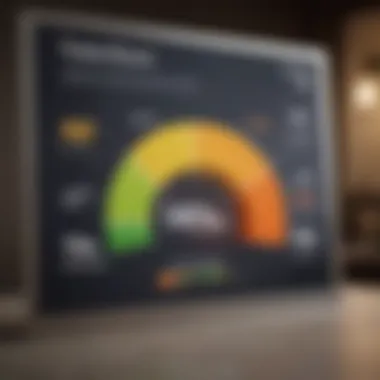Understanding Mortgage Rates with a 760 Credit Score


Intro
In today’s financial landscape, understanding mortgage rates is crucial for anyone looking to buy a home. A 760 credit score stands as a significant milestone that can greatly influence the borrowing experience. Borrowers with this score often enjoy better loan terms and lower interest rates compared to those with lower scores. But what exactly does it mean to have a 760 credit score in the context of mortgage financing?
This article will delve into the implications of possessing a 760 credit score when applying for a mortgage. We will explore how credit scores affect mortgage rates, the specific benefits that come with reaching this score, and the broader array of mortgage financing options available. By understanding the factors that influence rates and the mortgage process, both beginner and seasoned investors can better navigate the complexities of home buying.
An informed borrower is an empowered borrower. Therefore, let’s take the first step toward understanding the terminology and definitions related to mortgage rates.
Definitions and Terminology
When discussing mortgage rates, it's important to familiarize yourself with key terms that will help you grasp the underlying concepts. Understanding these terms can play a fundamental role in your mortgage application process.
Comprehensive Investment Terms
- Credit Score: A numerical expression of a person’s creditworthiness. A score of 760 usually falls into the "very good" range.
- Interest Rate: The cost of borrowing expressed as a percentage. It influences how much you will pay over the life of the loan.
- APR (Annual Percentage Rate): This includes the interest rate plus other fees or costs associated with obtaining the loan. It provides a more comprehensive view of the cost.
- Amortization: This refers to the gradual repayment of the loan principal over a specified period.
Common Financial Jargon
- Loan-to-Value Ratio (LTV): This ratio measures the loan amount against the appraised value of the property. A lower LTV can result in more favorable rates.
- Points: These are upfront fees that you can pay to lower your interest rate. Paying points may be a worthwhile strategy if you plan to stay in the home long-term.
- Pre-approval: This is a lender's estimate of how much you can borrow based on your financial situation. It is an important step before house hunting.
Understanding these terms lays the foundation for comprehending the implications of a 760 credit score on mortgage rates.
Expert Advice
When it comes to securing a favorable mortgage rate, strategies vary based on your experience level. Here, we present a look into methods both for novice borrowers and those with a more seasoned grasp of the housing market.
Strategies for Beginner Investors
- Know Your Financial Situation: Assess your credit score, income, and debt. This will help you understand what you can afford.
- Shop Around: Different lenders offer different rates and terms. Don’t settle for the first offer.
- Consider a Fixed-Rate Mortgage: This provides stability in payments over time, making it a good choice for first-time buyers.
Advanced Techniques for Seasoned Investors
- Leverage Your Equity: If you own property already, using equity can provide funds for a new purchase.
- Utilize Financial Products: Some advanced options like HELOCs or cash-out refinancing can be beneficial, depending on your financial goals.
- Maintain a Diverse Portfolio: Having varied investments can give you leverage when negotiating with lenders.
"Understanding mortgage rates and their relationship with your credit score can significantly impact your financial future."
By focusing on these elements, borrowers can better navigate their mortgage journey, especially with a strong credit score like 760. Together, we can approach the deeper considerations that come next.
Prolusion to Credit Scores
Understanding credit scores is crucial when navigating the mortgage landscape. This article aims to illustrate how a credit score, specifically a 760, influences mortgage rates and the overall borrowing experience. A credit score is not just a number; it represents your creditworthiness to lenders. This score impacts various aspects of lending and financing options available to you.
In mortgage lending, a higher credit score often leads to better rates and terms. For individuals seeking favorable mortgage conditions, being informed about credit scores can make a significant difference in financial outcomes. The conversation will cover the definition of credit scores, their importance in securing loans, and the implications of achieving the 760 benchmark.
Defining Credit Score
A credit score is a numerical representation of an individual's creditworthiness, typically ranging from 300 to 850. It is calculated based on several factors, including payment history, amounts owed, length of credit history, new credit, and types of credit used. The scores help lenders assess the risk involved in lending money. A score of 760 is often viewed as an indication that the borrower is financially responsible and less likely to default on their loans. In essence, this score opens doors to better mortgage opportunities and loan options.
Importance of Credit Scores in Lending
Credit scores play a vital role in lending as they help determine the conditions under which a loan may be offered. Lenders often have internal policies that dictate lending criteria. A strong credit score like 760 significantly enhances your bargaining power when negotiating mortgage terms.
- A higher score may qualify borrowers for lower interest rates.
- It can lead to reduced closing costs.
- Borrowers with high credit scores often face less scrutiny during the loan approval process.
A score of 760 can often mean the difference between approval and rejection for a loan application. Understanding the significance of your credit score is essential for making informed decisions surrounding your financial future.
Understanding a Credit Score


A 760 credit score is recognized as an excellent credit score by most lending institutions. It opens the door to more favorable mortgage rates and terms since it shows that the borrower is responsible and a lower risk. Understanding the details behind a 760 credit score aids in grasping the broader theme of how credit scores affect borrowing capabilities.
Achieving a score of 760 means that a borrower has consistently made timely payments, maintained low credit utilization, and has a healthy mix of credit types. This score can serve as a benchmark for those aiming for home financing and illustrates the significant advantages tied to good credit behavior.
With this score, borrowers generally receive better mortgage options. When applying for a mortgage, those with a 760 score will typically see lower interest rates when compared to those with lower scores. Furthermore, lenders view applicants with such scores as less risky, which could lead to more favorable loan terms overall.
What Constitutes a Credit Score?
To reach a 760 credit score, one must understand several key components:
- Payment History: This accounts for approximately 35% of the score. Consistency in paying debt on time is crucial here.
- Credit Utilization Ratio: This is the amount of credit used compared to the total available credit. Keeping this ratio below 30% is recommended.
- Length of Credit History: A longer credit history, typically over five years, positively affects the score.
- New Credit Inquiries: Opening many new accounts in a short time can negatively impact the score. It's optimal to limit new credit inquiries.
- Types of Credit: A diverse range of credit, including credit cards, installment loans, and mortgages, can benefit the score.
A score of 760 and above indicates a robust credit profile. It is critical to monitor these elements and address any issues that might arise, ensuring the score does not fall below this desirable threshold.
How Credit Scores Are Calculated
The calculation of credit scores is not arbitrary. It follows a defined structure:
- FICO and VantageScore: These are two main scoring models used by lenders. Each model has its unique weighting of the factors that contribute to the scores.
- Regular Updates: Credit scores are updated frequently based on changes in personal credit behavior and new information reported by creditors.
- Credit Reports: The scores draw from the data found in credit reports generated by agencies such as Experian, Equifax, and TransUnion. Errors in these reports can lead to inaccuracies in the scores.
- Ratio Formats: Credit scoring models use intricate algorithms that weigh each factor differently. Payment history is the most important, while new credit inquiries hold less weight.
The process of calculating a credit score ensures that it reflects the borrower's financial behavior accurately. To maintain or achieve a score of 760, regular monitoring and proactive credit management is necessary.
Impact on Mortgage Rates
Understanding how mortgage rates are impacted by credit scores is crucial for anyone considering financing a home. Specifically, a 760 credit score often equates to favorable mortgage rates. Lenders use credit scores to assess risk. The higher the score, the lower the perceived risk. This means individuals with a 760 score are more likely to receive lower interest rates. Lower rates can save thousands over the life of a mortgage.
Correlation between Credit Score and Mortgage Rates
The correlation between credit scores and mortgage rates has been well established in the lending industry. A strong credit score, such as 760, signals to lenders that the borrower has a history of managing credit responsibly. This typically translates into competitive rates.
- Lender Risk Assessment: Lenders evaluate the risk involved in lending. A higher credit score minimizes their risk. This usually results in lower interest rates for borrowers.
- Rate Variability: A variation can exist based on multiple factors. This includes market conditions, lender guidelines, and other borrower traits. However, the foundational relationship remains clear. Generally, each tier of credit score, from poor to excellent, aligns with specific interest rate brackets.
For individuals with a 760 credit score, the differences in mortgage rates compared to a score in the lower range can be substantial. A slight increase in interest rates can mean a significantly larger amount paid over time. Thus, maintaining a good credit score helps not only in securing the loan but also in reducing the costs associated with it.
"A higher credit score can decrease the overall cost of borrowing, providing significant financial advantages."
Typical Mortgage Rates for High Credit Scores
High credit scores often yield specific types of mortgage rates that are attractive to borrowers looking to finance a home. Typically, borrowers with a credit score of 760 can expect to see rates that are on the lower side of the spectrum.
- Market Comparisons: When comparing mortgage rates, borrowers with 760 credit scores can expect rates that are approximately 0.25% to 0.5% lower than those with average credit scores.
- Examples: For a $300,000 mortgage, a difference of even 0.25% can result in thousands saved in interest payments over the loan’s duration.
- Loan Types: Conventional loans, FHA loans, and VA loans also display varying rates, but a high credit score often enables access to the best options in all categories.
In summary, having a 760 credit score significantly benefits mortgage applicants via lower rates and favorable loan terms. Moving forward, understanding this relationship can aid borrowers in their mortgage journey.
Advantages of a Credit Score
A credit score of 760 represents a significant milestone in an individual’s financial credibility. This score, falling into the "excellent" range, opens up various possibilities, especially when it comes to mortgage applications. Understanding the advantages of maintaining such a high score can be invaluable for those entering the housing market or refinancing existing loans. It is not merely about having a number; it conveys a broader narrative of financial reliability and responsible management.
Lower Interest Rates
One of the most immediate benefits of a 760 credit score is the potential for lower interest rates on mortgage loans. Lenders typically view borrowers with high credit scores as less risky. As a result, they are more inclined to offer them favorable interest rates compared to those with lower scores. For instance, a slight decrease in interest rates can lead to substantial savings over the life of a mortgage. An individual with a 760 credit score may qualify for rates that are significantly lower than the market average. Even a quarter-point reduction can save thousands of dollars in interest payments.
Consider this: A mortgage of $300,000 at a 4% interest rate over 30 years results in total payments of about $574,000. However, reducing the rate to 3.75% lowers the overall payment to around $548,000. This reduction underlines the financial advantage a 760 credit score achieves.
Better Loan Terms
Beyond lower interest rates, a 760 credit score can also lead to broader loan options and better terms. Lenders often provide more flexible repayment terms for high-scoring borrowers, understanding their capability to manage debt effectively. These terms might include:


- Higher loan amounts: The ability to borrow larger sums suited to purchasing dream homes.
- Shorter loan durations: Options for 15-year vs. 30-year mortgages may be more accessible, which can lead to fewer interest payments overall.
- No or low private mortgage insurance (PMI): A high credit score might exempt borrowers from securing PMI, thus reducing monthly payments.
Ultimately, these benefits create a more favorable borrowing landscape that can align financing with personal financial goals.
Increased Approval Chances
Lastly, having a 760 credit score considerably enhances the likelihood of mortgage approval. Lenders are more willing to approve loans for individuals in this credit tier because of the confidence in their ability to repay. While other factors such as income, employment history, and debt-to-income ratio also play roles, a high credit score acts as a distinct advantage. This correlation is especially relevant in competitive markets where multiple buyers vie for the same properties. A solid credit score can effectively differentiate an applicant from others, influencing lenders’ decisions positively.
In summary, a 760 credit score provides clear benefits in the mortgage landscape, influencing interest rates, loan terms, and approval likelihood. By maintaining such a score, individuals position themselves strategically when navigating the complex world of mortgage financing.
Factors Influencing Mortgage Rates
Understanding the factors that influence mortgage rates is crucial for anyone with a 760 credit score. While having a high credit score certainly helps in securing favorable mortgage terms, it is not the sole determinant of the rates you may encounter. Various elements come into play, and being aware of them can empower borrowers in their home-buying journey.
Economic Indicators
Economic indicators play a significant role in determining mortgage rates. These indicators gauge the general health of the economy and influence the lending environment. Key indicators include the inflation rate, unemployment rate, and overall economic growth.
- Inflation Rate: Rising inflation often leads to increased interest rates. Lenders adjust rates based on inflation expectations to maintain their profit margins.
- Employment Figures: A higher employment rate usually correlates with a stronger economy, which can contribute to higher mortgage rates.
- Consumer Confidence Index: When consumers feel good about their financial situation, they tend to borrow more. This demand can push rates higher.
Keeping an eye on these economic indicators will give you a better understanding of the market trends. Monitoring reports from organizations like the Federal Reserve can provide insightful data.
Lender Policies
Lender policies are another critical factor influencing mortgage rates. Each lending institution operates under different guidelines which define their risk tolerance and overall pricing strategy. These policies can vary in several ways:
- Credit Risk Assessment: Even with a good credit score, lenders may have varying criteria that affect mortgage rates. Some lenders might upgrade or downgrade rates based on additional factors like your income stability or employment history.
- Loan Products Offered: Different mortgage products can have distinct rate structures. A lender might offer better rates on specific loan types, such as a conventional loan versus an FHA loan.
- Origination Fees: Some lenders charge higher origination fees that can affect the overall cost of the loan. It’s essential to analyze these fees alongside the interest rate.
To navigate lender policies effectively, consider obtaining quotes from multiple lenders. This enables you to compare and find the most advantageous terms for your situation.
Loan Types and Duration
The type of loan and its duration can significantly impact mortgage rates. Not all loans are created equal, and borrowers need to consider both loan structure and their needs when choosing.
- Fixed-Rate Mortgages: These loans provide a consistent interest rate throughout the life of the loan, which is favorable during periods of rising rates. Borrowers with a stable credit score and long-term plans often prefer fixed-rate options.
- Adjustable-Rate Mortgages (ARMs): These may start with lower rates, but they can fluctuate over time based on market conditions. This can be a gamble for borrowers who plan to stay in their homes for a shorter term.
- Loan Duration: Shorter-term loans typically come with lower interest rates. A 15-year mortgage may have better rates compared to a 30-year option, although the monthly payments are higher.
Understanding Mortgage Products
When considering a mortgage, understanding the different types of mortgage products available is crucial. Each product serves specific needs and comes with its own set of benefits, terms, and potential limitations. For individuals with a 760 credit score, the variety of options can enhance one’s ability to secure favorable terms. Therefore, it is valuable to explore the main types of mortgage products in detail.
Fixed-Rate Mortgages
A fixed-rate mortgage is one of the most traditional mortgage options. This product features an interest rate that remains constant over the life of the loan. This stability makes budgeting easier for homeowners, as monthly payments do not change. For a borrower with a 760 credit score, securing a fixed-rate mortgage often results in lower rates compared to those with lower credit scores, which translates into significant savings over the loan's term.
One important point to mention is that fixed-rate mortgages usually come in various terms, such as 15, 20, or 30 years. Borrowers need to assess their financial situation and long-term plans when choosing a term. Shorter terms typically carry lower interest rates, but they produce higher monthly payments.
Adjustable-Rate Mortgages
Adjustable-rate mortgages (ARMs) differ significantly from fixed-rate options. With ARMs, the interest rate is variable and can change at specified intervals after an initial fixed period. For instance, a common structure might be a 5/1 ARM, where the interest rate is fixed for the first five years and adjusts annually thereafter.
For a borrower holding a 760 credit score, ARMs can be attractive because they often start with lower rates than fixed-rate mortgages. However, it is essential to recognize the risks involved. Rates can increase, leading to higher payments in subsequent years. Borrowers should carefully calculate potential future payments and consider their long-term housing plans before opting for an ARM.
FHA and VA Loans
FHA (Federal Housing Administration) and VA (Department of Veterans Affairs) loans are specialized mortgage products designed to assist specific groups of borrowers. FHA loans are aimed at those with lower credit scores or smaller down payments, making them accessible for many first-time homebuyers. Although a credit score of 760 is above the minimum requirement for these loans, potential advantages still exist, such as lower mortgage insurance premiums.
VA loans, available to military veterans, active service members, and eligible spouses, do not require a down payment or private mortgage insurance. For individuals with a 760 credit score, this can be a great opportunity to purchase a home without additional costs. It is beneficial for eligible borrowers to explore both FHA and VA loan options to determine if they can take advantage of the favorable terms these products offer.


Understanding these mortgage products is essential when navigating the complex landscape of mortgage financing. By aligning one’s credit score with appropriate mortgage options, borrowers can maximize their financial outcomes.
Navigating the Mortgage Process
Navigating the mortgage process is a crucial aspect for anyone looking to secure a home loan. This journey can be complex, especially for first-time buyers. Understanding the steps involved can demystify the process and help borrowers make informed decisions. With a credit score of 760, the chances of receiving favorable terms increase, but knowing the steps can further enhance this advantage. Each piece of the process plays a significant role, from pre-approval to choosing the right lender and finally closing the loan.
Pre-Approval Steps
Pre-approval is often seen as the first step in the mortgage process. It is essential because it provides a clearer understanding of how much you can borrow. When seeking pre-approval, a lender will examine your financial status, including credit history, income, and existing debts. A 760 credit score simplifies this step. Borrowers with high credit scores are usually considered less risky. This means lenders may offer better loan options.
Important pre-approval steps include:
- Gather necessary documents: Pay stubs, tax returns, and bank statements are typically required.
- Submit pre-approval application: This can often be done online. Make sure to fill in all information accurately.
- Lender review: The lender will review your application and give you a pre-approval amount. This gives you confidence in your home shopping.
Choosing a Lender
Selecting a lender is another key aspect. Each lender offers different rates and terms, so it is important to compare them carefully. With a 760 credit score, you have the luxury of negotiating better terms. Consider factors such as customer service, fees, and their reputation in the market.
Here are some tips for choosing the right lender:
- Research multiple lenders: Don't settle for the first option. Explore banks, credit unions, and online lenders.
- Ask for recommendations: Speaking with friends or family who have recently taken out mortgages can be helpful.
- Review interest rates and terms: Look for any hidden fees or conditions that may complicate the loan.
Closing the Loan
Finally, closing the loan is the last step in the mortgage process. This is where all the paperwork is finalized and the loan is officially granted. For borrowers with a 760 credit score, this might include less stress as they often receive better terms. It is essential to understand what to expect on closing day.
Key points to consider include:
- Final walkthrough: Ensure the property is in the agreed condition before closing.
- Review closing documents: Take the time to read all documents thoroughly. Ask questions if something is unclear.
- Payment of closing costs: Be prepared for various fees, such as appraisal and origination fees.
By understanding these steps—pre-approval, choosing a lender, and closing—you can enhance your mortgage experience. Being well-prepared leads to better decisions.
Navigating the mortgage process requires attention and preparation. With the right knowledge and a strong credit score, borrowers can secure favorable terms for their housing finance needs.
Maintaining a High Credit Score
Maintaining a high credit score is a critical aspect of securing favorable mortgage rates. For those with a 760 credit score, understanding this concept is essential not just for the current mortgage but for future financial opportunities as well. A high credit score signifies that a borrower is low risk for lenders, leading to lower interest rates, better loan terms, and higher approval odds. Moreover, it can influence other financial products like credit cards and personal loans, reinforcing the need for diligent score maintenance.
Regular Monitoring
Regular monitoring of your credit score is vital. Credit scores can fluctuate due to various factors, including payment history, credit utilization, and new credit inquiries. A missed payment can significantly impact your score. Thus, utilizing credit monitoring tools allows you to stay informed and proactive in maintaining a healthy score.
- Check Your Credit Report: It’s advisable to review your credit report at least once a year. You can get free copies from the three major credit bureaus: Equifax, Experian, and TransUnion. Look for errors or discrepancies that could lower your score.
- Track Changes: Knowing how your score changes over time helps you understand what actions positively or negatively affect it.
In essence, regular monitoring gives you the control needed to respond swiftly to any changes, ensuring your score remains at its peak.
Managing Debt Responsibly
Responsible debt management is another key factor in maintaining a high credit score. Effective handling of debts contributes to a stable credit profile. Here are some practical strategies:
- Keep Credit Utilization Low: Aim to use less than 30% of your available credit. High utilization can signal risk to lenders.
- Pay Bills on Time: Timely payments significantly contribute to your payment history, which is the largest factor in credit scoring. Set up payment reminders or automatic payments to avoid late fees.
- Diversify Credit Types: A mix of credit types—such as installment loans and revolving credit—can enhance your score. However, take on only what you can handle.
The mantra is simple: avoid taking on more debt than you can manage. By doing this, you not only maintain your score but also foster financial health.
"A strong credit score is not just about borrowing; it's about the potential financial opportunities that come with it."
Epilogue
In this article, we have thoroughly examined the role of a 760 credit score in the mortgage landscape. Understanding mortgage rates with a high credit score is crucial for both new and experienced borrowers. A 760 score positions individuals as low-risk clients to lenders, leading to several tangible benefits, particularly when it comes to securing favorable loan terms.
Summary of Key Insights
A 760 credit score signifies a strong credit history and financial reliability. Key insights from this article include:
- Impact on Rates: Higher credit scores typically correlate with lower interest rates, which can lead to significant savings over the lifespan of a mortgage.
- Favorable Loan Terms: Borrowers with a 760 credit score often receive better terms, such as lower down payment requirements and flexibility in repayment options.
- Approval Benefits: The likelihood of mortgage approval increases, allowing borrowers more leverage in negotiations.
- Influencing Factors: Mortgage rates fluctuate based on various factors, including economic indicators, lender policies, and the type of loan. A good credit score enhances a borrower’s position in conversations about these rates.















